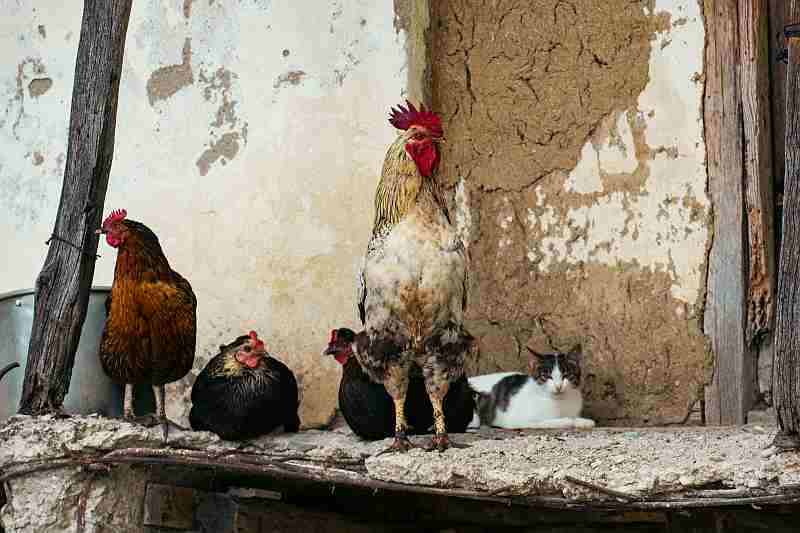Have you ever wondered if your purring pet could turn predator on your backyard chickens? You’re not alone. Many grapple with the question, “Do cats kill chickens?” It’s a cat and mouse, or rather, cat and chicken game.
In this article, we’ll explore the fascinating world of cat predation, the vulnerability of chickens, and strategies you can employ to keep your feathery friends safe.
We’ll even delve into success stories of cats and chickens living peacefully together.
Let’s unravel this mystery together.
Key Takeaways
- Cats have natural predatory instincts and can prey on small animals like mice and birds.
- Chickens have defense mechanisms and can identify threats, such as fleeing to higher locations or grouping together.
- Factors like chicken breed selection and cat temperament play a role in cat-chicken interactions.
- Strategies such as secure coop design and feline repellents can be used to protect chickens from cats.
Understanding Cat Predatory Instincts
In understanding your cat’s predatory instincts, it’s essential to recognize that they’re natural hunters. This innate behavior isn’t just confined to wild cats but also extends to domestic ones. Their feline hunting techniques result from evolutionary adaptation, honed over thousands of years.
Following a pattern of stalk, pounce, and kill, domestic cats’ prey can range from small animals like mice and birds to larger ones, depending on the cat’s size, agility, and opportunity. While you mightn’t like all aspects of your pet’s hunting behavior, remember it’s an instinct rather than a sign of aggression or malice.
Therefore, managing their hunting tendencies responsibly is critical, especially if you have other small pets or livestock at home.
Chicken Vulnerability and Defense Mechanisms
Taking into account your cat’s hunting instincts, it’s essential to understand the vulnerability and defense mechanisms of chickens, particularly if they’re part of your household or farm.
Chickens, while generally docile, aren’t entirely defenseless. Certain chicken breeds demonstrate resilience through their sharp beaks and claws that can cause significant harm to a small predator like a cat. However, their primary defense lies in their avian intelligence.
Through exploration and learning, chickens can identify potential threats and react appropriately. For example, they may flee to a higher location or group together to appear more intimidating.
Understanding these mechanisms can help you manage interactions between your cats and chickens, minimizing potential conflicts. Your role is to ensure a safe environment that respects the instincts of both animals.
Factors Influencing Cat-Chicken Interactions
While you might assume that all cats pose a threat to chickens, it’s essential to understand that various factors can influence these interspecies interactions. Chicken breed selection is a crucial determinant. Some breeds are more assertive and capable of defending themselves against potential threats. Conversely, other breeds might be more susceptible to predation due to their docile nature or smaller size.
Another critical factor is cat temperament analysis. Not all cats exhibit the same predatory tendencies. Some cats might be more inclined to hunt, driven by instinct or hunger, while others, especially well-fed indoor cats, might show little interest in chickens. Understanding these variables can help in managing cat-chicken interactions and mitigating potential risks.
Strategies to Protect Your Chickens
Now that you know the factors influencing cat-chicken interactions, let’s look at effective strategies to safeguard your chickens from potential feline threats.
Crucial to your defense strategy is the chicken coop design. Ensure it’s secure, with no gaps or weak spots for cats to exploit. Use sturdy materials and consider elevating the coop to deter curious cats.
Feline repellents can also be part of your strategy. Commercial products are available, emitting smells that cats detest, providing further protection. Additionally, you could use natural deterrents like citrus peels or rosemary.
Case Studies: Cats and Chickens Coexisting
Despite the potential risks, there are numerous instances where cats and chickens live together harmoniously, and it’s these scenarios we’ll delve into next.
Case studies show that coexistence benefits both species. Chickens often help cats to adjust their feline behavior, making them less predatory. In one case, a farm cat named Toby began miming the chickens’ foraging behavior rather than hunting them. Similarly, a domestic cat, Bella, formed a symbiotic relationship with the resident chickens, offering protection from other predators in return for companionship.
It’s essential to understand that these scenarios require time and careful management. But with patience and observation, it’s possible to create a peaceful cohabitation environment.
Frequently Asked Questions
What Specific Breeds of Cats Are Known to Be More Aggressive Towards Chickens?
No specific breed of cat is inherently more aggressive towards chickens. It’s more about individual feline hunting instincts and personality traits. You’ll find variations even within the same breed. It’s all quite individual.
How Does the Age of the Cat Influence Its Likelihood to Attack Chickens?
As a cat matures, its predatory instincts often intensify. Therefore, an older cat might pose a greater threat to chickens. However, this can vary widely based on the cat’s temperament and upbringing.
Are There Any Specific Signs That a Cat Is Likely to Attack a Chicken?
You should watch for cats’ hunting instincts kicking in. If they’re eyeing your chicken coop with intense focus, it’s a red flag. Enhanced coop security is crucial to deter potential attacks.
How Do Chickens React When They Sense a Threat From Cats?
When sensing a threat from cats, chickens employ various escape strategies. They’ll often show signs of distress, like squawking, and may try to fly or run to safety, demonstrating predator-prey dynamics.
Are There Any Documented Cases of Chickens Injuring or Killing Cats in Self-Defense?
Though rare, there are documented cases where ‘chicken strategies’ have injured cats. However, ‘cat counterattacks’ are typically more effective. As the saying goes, “Don’t count your chickens before they hatch.”
Conclusion
In the age-old game of cat and mouse, or in this case, cat and chicken, the rules aren’t black and white. It’s a complex dance influenced by variables from breed to environment.
Yet, with knowledge and strategic measures, harmony can exist. You can maneuver your pieces like an experienced chess player, ensuring your chickens’ safety without stifling your cat’s instincts.
Remember, it’s not about winning or losing; it’s about fostering a peaceful coexistence.

